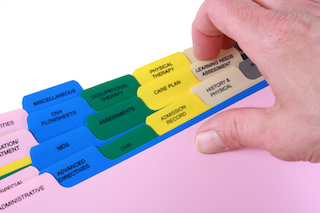 The new study, titled, Assessment of U.S. Hospital Compliance With Regulations for Patients’ Requests for Medical Records, published on the JAMA Network, was focused on shedding light on the challenges that patients experience when requesting medical records.
The new study, titled, Assessment of U.S. Hospital Compliance With Regulations for Patients’ Requests for Medical Records, published on the JAMA Network, was focused on shedding light on the challenges that patients experience when requesting medical records.
“We wanted to evaluate each aspect of the request process, from analyzing the medical records request forms to calling medical records departments as a simulated patient with questions about the request process, to identify areas that need improvement," study author Carolyn Lye told us. “We were not sure the extent of the problem, but we were expecting that there would be long processing times and request processes that would be difficult for patients to navigate.”
Lye and her colleagues had heard about patients having difficulty with obtaining records due to various reasons, namely with costs and processing times. Under the Privacy Rule of the Health Insurance Portability and Accountability Act of 1996 (HIPAA), the patients' right of access is clearly outlined, however, she and her colleagues suspected that hospitals may not be completely transparent about the medical records request process and may be noncompliant with the right of access.
“We have not seen any studies that systematically evaluate each aspect of the request process, from analyzing the request forms to calling the medical records departments, and looking at what information can be requested, which formats copies of records can be received, costs of these requests, and processing times,” Lye told us. “We thought that this study would support and validate what we know patients are experiencing when requesting medical records, and that this would encourage future policies and guidelines to more strictly enforce the right of access.”
The study was conducted by analyzing the medical records request forms to understand the options that hospitals were providing patients in regards to requestable information and formats of release, and whether they stated costs and processing times. Researchers then called medical records departments at 86 top-ranked hospitals as a simulated patient asking questions about the medical records request process, asking about requestable information, formats of release, costs, and processing times according to a predetermined script.
“Our results demonstrated that there are issues of noncompliance and lack of transparency in all components of the medical records request process,” Lye told us. “In terms of requestable information, hospitals were not forthcoming about all types of information that can be requested, and only 53% of hospitals indicated on their request forms the option of requesting the entire medical record when all hospitals stated that they were able to over the telephone calls.”
In terms of formats of release, there were discrepancies between what was offered on the request forms and what hospitals stated they could offer over telephone calls, with mail being the only option provided by all hospitals and limited digital access via email and patient portals across hospitals in the study population. Costs varied greatly, from $0.00 to $514.50 for a hypothetical 200-page record, and processing times varied greatly as well, from 0 to 60 days, 30 days being the federal requirement for medical records requests (not including the single 30-day extension that is possible) and 30 days or fewer depending on individual state requirements. At least eight per cent of hospitals were noncompliant with their state's requirement for processing times.
“We expected to find challenges in the request process, but we were surprised that every step of the request process was fraught with issues,” Lye told us. “I was also surprised during our calls with medical records departments, that medical records department representatives did not seem aware of what constitutes the right of access. Representatives would cite various reasons for why they cannot release copies of records in certain formats (for example, that they can only fax records to health care providers, not to patients), that showed that they do not know that patients should be able to receive records in any format they request as long as it is readily reproducible in that format.”
As this study identifies all the major challenges in the medical records request process across several hospitals, Lye and her colleagues hope that policies that are focused on improving patient access will be able to target these specific challenges and more strictly enforce the right of access.
“We hope that patients will also gain insight about their right of access by reading our study,” Lye told us, “and that this study empowers patients to exercise their right of access when requesting medical records.”
Patricia Tomasi is a mom, maternal mental health advocate, journalist, and speaker. She writes regularly for the Huffington Post Canada, focusing primarily on maternal mental health after suffering from severe postpartum anxiety twice. You can find her Huffington Post biography here. Patricia is also a Patient Expert Advisor for the North American-based, Maternal Mental Health Research Collective and is the founder of the online peer support group - Facebook Postpartum Depression & Anxiety Support Group - with over 1500 members worldwide. Blog: www.patriciatomasiblog.wordpress.com
Email: tomasi.patricia@gmail.com